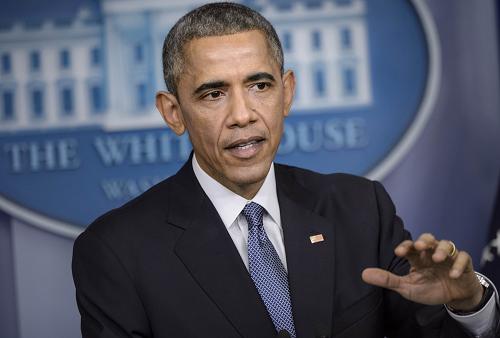US diplomacy in 2014: Confidence and challenges
- By Wei Hongxia
 0 Comment(s)
0 Comment(s) Print
Print E-mail cntv.cn, December 25, 2014
E-mail cntv.cn, December 25, 2014
|
US President Barack Obama speaks during a press conference in the briefing room of the White House December 19, 2014 in Washington, DC. [Xinhu photo] |
On December 17, US President Barrack Obama announced a comprehensive set of measures to improve US-Cuba relations, setting out a new course for US-Cuba ties for the first time in more than 50 years. This demonstrates Obama's willingness to bring about meaningful change to the US-Cuba relationship. And this development has created a positive atmosphere for 2015.
Following this encouraging development, Obama used his weekly address on Dec. 20 to praise his administration. He reflected on the significant progress made in 2014, saying that the US is leading the rest of the world containing the spread of Ebola, degrading and ultimately destroying ISIS (the Islamic State of Iraq and Syria), and addressing the threats posed by climate change.
But looking back at 2014, Obama did not always have reason to be so positive, especially in the second half of the year.
Widespread protests began the day after a white police officer fatally shot African-American Michael Brown on August 9 in Ferguson, Missouri. The protests spread throughout December and caused civil disorder.
Although Obama has tried to make the case that his administration’s policies have steered his country away from the brink of economic collapse and laid a foundation for growth, he had to take the blame for his party’s defeat in the midterm elections. Amid criticism of US national security policy, Defense Secretary Chuck Hagel submitted his resignation after less than two years in the post.
Despite the domestic economic resurgence, Obama faces many foreign policy challenges.
The US wants to withdraw from Afghanistan, but it cannot. Obama won votes by promising to withdraw US armed forces from Iraq and Afghanistan in his campaign in 2009. In Feb. 2014, plans were made for the complete US withdrawal from Afghanistan in December. But on Dec. 6, shortly before his resignation, Defense Secretary Hagel declared that in 2015 the US would keep 10,800 troops in Afghanistan — about 1,000 more than that announced earlier this year. It seems that the US cannot or will not give up its counter-terrorism mission in Middle East.
Barack Obama’s "reset" policy toward Russia leads to no improvements in Russia-US relations. Tensions between Russia and the US have escalated over the Ukraine Crisis.
The US, together with its Western allies, strengthened sanctions on Russia, and Russia countered the sanctions by taking tougher stances. The growing rift between the US and Russia causes concerns throughout the international community.






